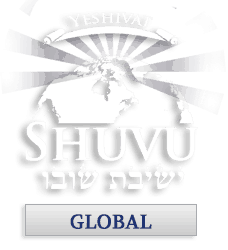כִּ֚י הַמִּצְוָ֣ה הַזֹּ֔את אֲשֶׁ֛ר אָֽנֹכִ֥י מְצַוְּךָ֖ הַיּ֑וֹם לֹֽא־נִפְלֵ֥את הִוא֙ מִמְּךָ֔ וְלֹֽא־רְחֹקָ֖ה הִֽוא: לֹ֥א בַשָּׁמַ֖יִם הִ֑וא לֵאמֹ֗ר מִ֣י יַֽעֲלֶה־לָּ֤נוּ הַשָּׁמַ֨יְמָה֙ וְיִקָּחֶ֣הָ לָּ֔נוּ וְיַשְׁמִעֵ֥נוּ אֹתָ֖הּ וְנַֽעֲשֶֽׂנָּה: וְלֹֽא־מֵעֵ֥בֶר לַיָּ֖ם הִ֑וא לֵאמֹ֗ר מִ֣י יַֽעֲבָר־לָ֜נוּ אֶל־עֵ֤בֶר הַיָּם֙ וְיִקָּחֶ֣הָ לָּ֔נוּ וְיַשְׁמִעֵ֥נוּ אֹתָ֖הּ וְנַֽעֲשֶֽׂנָּה: כִּֽי־קָר֥וֹב אֵלֶ֛יךָ הַדָּבָ֖ר מְאֹ֑ד בְּפִ֥יךָ וּבִלְבָֽבְךָ֖ לַֽעֲשׂתֽוֹ:
For this commandment which I command you this day, is not concealed from you, nor is it far away. It is not in heaven, that you should say, “Who will go up to heaven for us and fetch it for us, to tell [it] to us, so that we can fulfill it?” Nor is it beyond the sea, that you should say, “Who will cross to the other side of the sea for us and fetch it for us, to tell [it] to us, so that we can fulfill it?” Rather,[this] thing is very close to you; it is in your mouth and in your heart, so that you can fulfill it. –
Devarim 30:11-14
This week’s double parasha contains an exhortation that is commonly ignored within the body of Messiah. Moshe Rabeinu is quoting Hashem in saying that the commandments given to the children of Israel at Sinai are not beyond our capacity to perform. These commandments were given to us specifically so that we should perform them.
Hashem did not give us tasks to do that are impossible to do. He did not give us Torah so that we would see that it is impossible to follow. The mitzvot are in our heart and are in our mouth, and we can do them. The entire purpose of Torah, being the book of instruction, is that we should do it.
Torah is not an impossible task given to Israel with the certainty that we would fail. Torah was not given to us so that we would need Messiah and need Hashem’s grace and mercy. We are completely dependent on Messiah, and Hashem’s grace and mercy, with or without the Torah. As Paul indicates in Romans chapter 7, the purpose of Torah is to show us what sin is. In 1 John 3:4, we see that sin is defined as the violation of Torah. Nitzavim makes it clear: if we choose Torah, to do, the result is good, blessing. If we choose against Torah, the result is bad, curse. The point is that it is up to us.
We are to choose. We have free will. The entire purpose of creation is for us to choose Hashem, that is, to choose Torah. When we choose Torah; choose Hashem’s mitzvot, we are fulfilling Hashem’s purpose in creation. Choosing the mitzvot, doing the mitzvot, brings blessing to Israel and hastens the return of Yeshua the Messiah.
We can do it. We can hasten Yeshua’s return. It is not in heaven, it is not across the sea, it is in our heart and in our Nefesh to do. So every moment of every day, each of us has the choice. Do mitzvot, or don’t do mitzvot. The choice is plain, clear, and doable. There is no difference between different categories of mitzvot. There are no moral mitzvot, ceremonial mitzvot, cultural mitzvot – there are only mitzvot. “Do or do not, there is no try.” Shabbat shalom.
